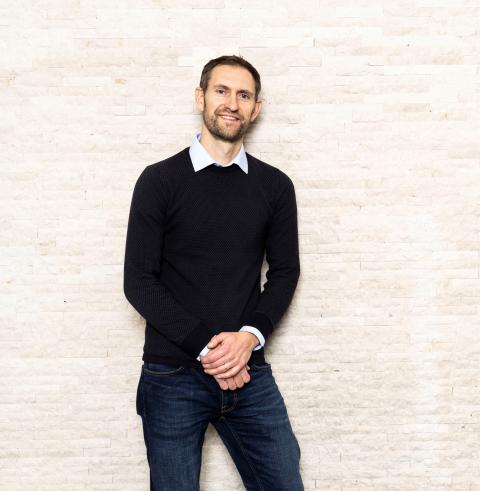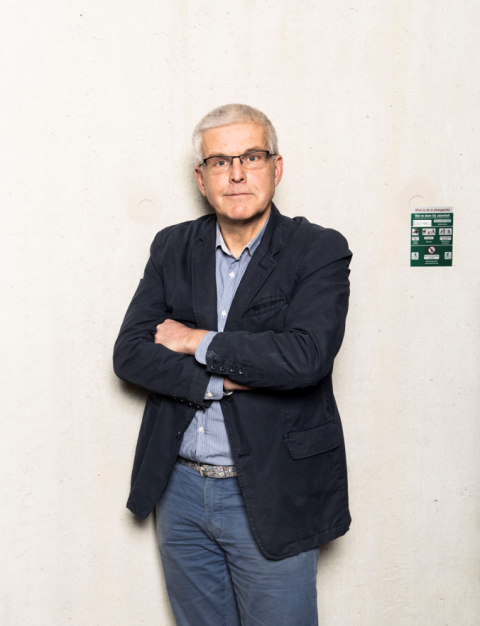“We can contribute more to a better world”
Providing emergency aid to people in a food crisis is badly needed – but it is far better to try to prevent such disasters by looking at structural causes and improving food systems, say Frans Cruijssen and Gerrit-Jan van Uffelen.
Using data models to contribute to more robust food systems in crisis areas is what the Zero Hunger Lab (ZHL) and the Wageningen Centre for Development Innovation (WCDI) are working on together. While Frans Cruijssen of the ZHL is looking into complicated data analyses, Gerrit-Jan van Uffelen of the WCDI is mainly concerned with the local situation in the Horn of Africa. Together, they are striving to find a long-term solution to the food problems that exist there. And that is much needed, says Van Uffelen: “We now have the highest number ever of people in a food crisis or worse. That’s the unpleasant truth. The way we as an international community intervene in these kinds of areas falls short.”

Frans Cruijssen (1979) studied econometrics in Tilburg and received his PhD from the same university in 2006. After a fourteen-year stint in business, he returned to Tilburg in 2020 to join the Zero Hunger Lab.
That sounds serious. Can you elaborate?
Van Uffelen: “Humanitarian aid is neutral. It helps the individual survive but makes no judgements about the cause of the crisis. As soon as you talk about warring parties and questions of blame, you lose the ability to provide impartial aid. This is a strength of the humanitarian system, but also a weakness. It means that we give countries aid year after year, but we cannot look at the structural causes of why that emergency aid is needed.”
Cruijssen: “In fact, emergency aid means you’re too late. Yes, the help is desperately needed, but in doing so you ignore the fact that you could often have made smart decisions to avoid the disaster in the first place. That’s what we should be investing in. Calculations have been done: every dollar you invest in measures to improve food systems and prevent problems equals six dollars that you will have to spend on emergency aid once the problem materializes. That realization is slowly beginning to sink in now.”
With this approach, we ensure that people’s realities are the main focus again
So, you are working with a relatively new method: the food system approach.
Van Uffelen: “Yes, we are using this to look at all parties together: emergency aid, development aid, and peace aid. It allows us to approach food insecurity as a whole. This is important, because for people in food crisis, it is one and the same reality. Twice a year, we are given an overview of the food security situation for those areas where we know food security is problematic. This allows us to see where things are going quite well, where and which groups of people are living in high levels of food insecurity, and which people are facing severe famine. It gives us a reasonable understanding of how food systems work and how they are changing. Based on that, we draw lines to the future: what will it take to make those food systems more robust?”
How far along are you in that process?
Van Uffelen: “We are still at the beginning. An important starting point is to understand what food systems are and how they work. For us, this project is also a search for new interventions that do justice to the reality of the local people. Interventions that connect to what people in crisis situations contribute to food systems themselves. That’s very important. I think that – when you look at how we have intervened internationally – we have lost sight of local reality. With this systems approach, we can put it back on the map, and make people’s realities the main focus again. That sounds very ambitious...”
Cruijssen: “...but you can also make it smaller. For example, there are your model gardens in the Horn of Africa. People from the region come there to see how to grow vegetables under different conditions. This way they learn to put together a diverse diet with what they grow themselves. That’s what I like about our collaboration: it lends the sets of figures and models that we work with in Tilburg so much more color.”

Gerrit-Jan van Uffelen (1965) is Senior Advisor at the Wageningen Centre for Development and Innovation, part of Wageningen University & Research. There, he directs several projects on food security.
So, that’s where the Zero Hunger Lab and Wageningen University & Research come together very well.
Cruijssen: “Certainly. Data analysis is more abstract and further removed from the people it concerns. This is what we can and do contribute well, but with this collaboration we can also do justice to local contexts. There, we can implement the interventions we come up with here. This helps us to make better predictions, which in turn enables the humanitarian world to make better decisions. We are also committed to accessible training of the people there, so that they learn what it takes to do simple food analyses. We’ve already developed these online training courses here, and we want to offer them to universities and governments there, in the hope that they will use them to come up with better programs and interventions.”
What do you yourself learn from this work?
Cruijssen: “There is no single answer to the food problem; it is not ‘one size fits all’. You have to look at a particular country, a particular town or village. What’s going on there? And what can we do to address that?”
Van Uffelen: “We live in one of the richest countries in the world, but we spend a lot of time worrying about ourselves. That’s a shame, because I think we can contribute more to a better world, where people don’t have to go hungry – at least not as much as they do now. This is also the primary motivation and challenge that drives us at the WCDI and the ZHL. This food systems approach has the potential to contribute to a different way of seeing and doing things in a fundamental way.”
Text: Eline Kraaijenvanger
Photos: Bram Belloni
Date of publication: 6 July 2022
